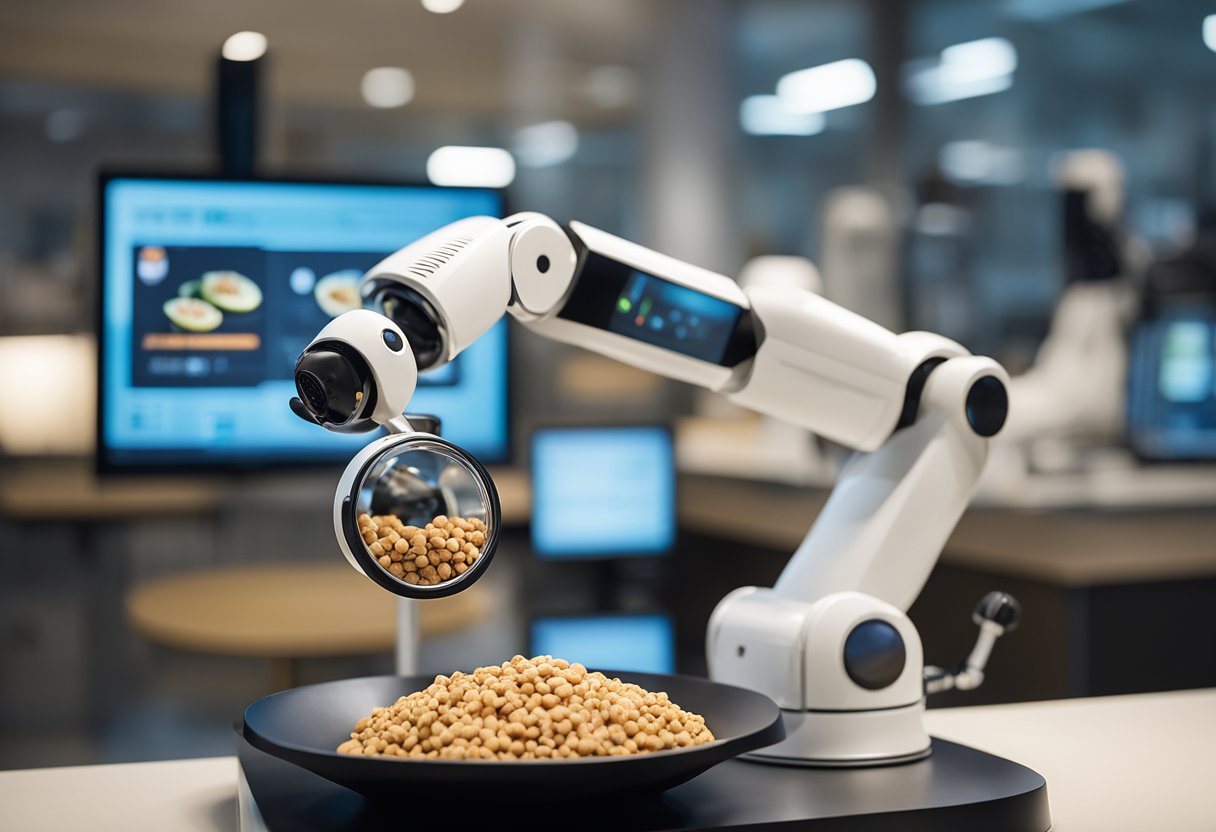Artificial Intelligence (AI) is transforming the way we care for our pets, offering tools that could redefine veterinary medicine, diagnostics, and treatment plans. As we embrace these advancements, it’s crucial for us to consider the ethical implications behind AI’s integration into pet care. From the automation of medical data analysis to the use of AI-driven diagnostic tools, these technologies bring about a range of ethical questions, including concerns about the proper use of animal data and the potential impact on the veterinarian-client relationship.
Ensuring that AI applications respect the privacy and welfare of animals is a top priority as we develop and implement new systems in veterinary clinics and pet care establishments. As guardians of our pets’ health, we are tasked with scrutinizing how AI interprets pet data, how it may influence treatment options, and the manner in which it could alter our interactions with pets. By actively engaging with these considerations, we can guide AI’s role in pet care towards a future that enhances the well-being of our furry companions without compromising foundational ethical standards.
Key Takeaways
- AI in pet care promises enhanced diagnostics and treatment but demands ethical vigilance.
- The welfare and privacy of pets are central to responsibly integrating AI into pet care.
- Active engagement with AI’s ethical implications is essential to its positive development in veterinary services.
Foundational Ethics in AI and Pet Care

As we venture into the exciting integration of artificial intelligence (AI) in veterinary medicine, it’s like opening a new chapter in pet care. Our curiosity piques at the possibilities AI brings to diagnosing and treating our furry friends. However, it’s crucial to anchor these advancements in strong ethical foundations.
The utilization of AI in pet care introduces a spectrum of ethical considerations we must address. Firstly, ensuring the welfare of the animals is paramount. AI tools should enhance, not compromise, the quality of care pets receive. Transparency is also essential; we must understand how AI reaches its conclusions in diagnoses or treatment recommendations.
Accountability takes center stage; we need clarity on who is responsible should an AI system malfunction or misdiagnose. A study highlighted by the American Veterinary Medical Association discusses the ethical and legal implications of AI and stresses the importance of delineating between machine and human accountability in veterinary care. Furthermore, the privacy of data is a critical concern. Pet owners’ trust is built on the assurance that their pets’ health data is used appropriately and safeguarded.
- Security risks and data breaches could lead to misuse of sensitive information, impacting both pets and owners significantly.
- Informed consent becomes more complex with AI integration. Owners must be fully aware of how AI is involved in their pet’s care.
Lastly, understanding AI’s limitations ensures realistic expectations and prevents over-reliance on technology. An article from NCBI offers insights into ethics applicable to AI, focusing on the importance of human oversight in AI’s application.
In essence, foundational ethics in AI and pet care blends traditional care principles with the innovative potential AI holds. As we adopt these technologies, maintaining ethical integrity ensures that our primary motive remains the heartfelt care and wellbeing of our beloved pets.
AI Interaction with Pets

As we navigate the ever-evolving landscape of technology, it’s becoming increasingly clear that AI has a significant role in the way we interact with and care for our pets. We’ve seen groundbreaking developments in AI that not only provide deeper insights into our pets’ behaviors but also enhance their well-being. Let us explore how AI is shaping our relationship with our furry friends, focusing on monitoring and engagement, behavioral analysis, and safety measures.
Monitoring and Engagement
Through sophisticated AI-powered devices, we’re now equipped to monitor our pets with unprecedented precision. Cameras and sensors can keep pets entertained and ensure they’re active, delivering peace of mind when we’re away. These tools can dispense treats, play interactive games, and even provide companionship with social robots designed for pets.
Behavioral Analysis
AI systems are incredibly adept at analyzing pet behavior, learning from their actions to identify patterns. This technology is revolutionizing our understanding of pets, as AI can detect nuanced changes that may indicate health issues or emotional states. With continuous learning capabilities, AI assists us in catering to our pets’ specific needs and preferences, fostering a deeper human-animal bond.
Safety Measures
The safety of our pets is paramount, and AI contributes significantly to this aspect. AI algorithms are effective in identifying potential dangers, from recognizing toxic foods in their environment to alerting us of unusual behavior that could signify an emergency. Moreover, AI can ensure that pets stay within safe zones through geofencing and provide real-time updates on their well-being, giving us an extra layer of security.
Data Privacy and Security

When we consider introducing Artificial Intelligence (AI) into our pet care practices, it’s crucial for us to address how personal data is safeguarded. As pet owners, we share a wealth of sensitive information, expecting it to remain private and secure. Encompassing both Pet Owner Information and Data Storage and Access Control, let’s dive into what makes these areas critical for ethical AI in pet care.
Pet Owner Information
We must treat the information we provide about ourselves with the utmost care. This includes our home address, contact details, and potentially our payment information. In the hands of AI, this data helps personalize our pet care experience, but without proper safeguards, it could be misused. Articles like AI Pets touch on the complexities and importance of protecting our personal data in the context of AI technology.
Data Storage and Access Control
Safe storage and strict access controls are the backbones of data security. We need to ensure that the AI systems we use for pet care store our data on encrypted servers with multi-factor authentication to restrict access. Effective data storage must prevent unauthorized data breaches, and robust access control measures should monitor who can view and manipulate the data. Maintaining the integrity of our personal data and that of our pets is non-negotiable.
AI in Veterinary Services
Incorporating artificial intelligence into veterinary medicine is transforming how we provide care for our pets. By harnessing the capabilities of AI, we’re able to offer precise diagnostic assistance and sophisticated treatment planning tailored to each animal’s individual needs.
Diagnostic Assistance
AI revolutionizes the way we diagnose health conditions in animals. Tools powered by artificial intelligence can analyze vast amounts of data, such as imaging and lab results, to assist in identifying diseases that could be missed by the human eye. For instance, AI can enhance the accuracy of radiographic analysis in detecting conditions like fractures or tumors.
- Supports veterinarians by highlighting anomalies in diagnostic images
- AI algorithms provide a second opinion, improving diagnostic confidence
Treatment Planning
Once a diagnosis is made, AI contributes significantly to the development of a treatment plan. It compares patient data against a global database of similar cases, ensuring that our furry friends benefit from the most effective treatment options. By integrating AI, we are making strides toward more personalized veterinary care, which can lead to better outcomes and improved quality of life for pets.
- Facilitates the creation of custom treatment protocols based on individual patient variables
- Monitors response to treatment, adjusting protocols as needed for optimal recovery
Long-Term Impacts of AI on Pet Wellness

We’ve all witnessed technology change how we live and work, but have you ever stopped to think about how it’s reshaping our pets’ lives too? Imagine a world where your furry friend’s health is continuously monitored, where their needs are anticipated and where they get the best care possible—this is where artificial intelligence (AI) steps in, promising a future that’s bright for our animal companions.
Our collective love for pets ensures we’re always on the lookout for ways to enhance their lives. AI in the field of pet care does just that, offering personalized attention that adapts as their needs evolve. Here’s how AI is set to impact pet wellness in the years to come:
- Preventive Health: AI systems can analyze vast amounts of health data, potentially spotting issues well before they become serious.
- Diet Optimization: Basing diets on activity levels, AI creates custom meal plans to maintain optimal pet health.
- Behavior Monitoring: A shift in behavior is often the first sign of distress; AI surveillance can alert us to subtle changes.
Lifetime Care and Comfort
AI can curate a comfortable environment for pets throughout their life stages by regulating home temperatures, suggesting exercise routines, and providing stimuli when they’re alone.
Emotional Well-being
AI-powered toys not only keep pets entertained but can also address emotional health by reducing anxiety and boredom.
We’re entering a new era where AI is a game-changer for pet wellness by offering sustainable and impactful solutions that often outperform human-only care strategies. As we embrace this exciting future, it’s on us to ensure that AI’s role in our pets’ lives is shaped with love, care, and ethical responsibility.
Frequently Asked Questions
We understand your concern about how artificial intelligence is reshaping pet care. Our aim is to provide thoughtful insights into the most pressing concerns and how we can navigate this technology with your pet’s best interest in mind.
What are the potential consequences of replacing human judgment with AI in diagnosing pet health issues?
When AI substitutes for human judgment, there’s a risk of losing the nuanced understanding that experienced veterinarians offer. Over-reliance on AI could lead to misdiagnoses. However, AI in Veterinary Care: Revolutionizing Diagnoses and Treatments emphasizes that integrating AI can result in more accurate diagnoses and treatments when used as an aid rather than a replacement.
How can veterinarians ensure that AI tools used in pet care adhere to existing animal welfare regulations?
Veterinarians must be vigilant in selecting AI tools that are compliant with animal welfare laws. It is crucial to collaborate with ethical AI developers and stay informed about regulations, as suggested in an analysis by Springer on the ethics of using AI in veterinary medicine.
In what ways could AI in pet care lead to biases, and what measures can be taken to prevent them?
Biases in AI can stem from skewed data sets or flawed algorithms. To prevent such biases, it’s essential to have diverse data and ongoing oversight. The AVMA suggests clear guidelines are necessary, as articulated in their report on the ethical implications of AI in veterinary medicine.
What privacy concerns should be addressed when using AI to manage pet health data?
Protecting pet health information is paramount. Ensuring data privacy in AI-powered pet care involves securing data from unauthorized access and being transparent with pet owners about who has access to their pet’s data and why.
How should the responsibility be shared between AI developers and veterinarians when it comes to AI-related errors in pet care?
Responsibility should be a shared venture. AI developers must rigorously test their systems, while veterinarians should apply critical judgment and not solely rely on AI recommendations. Both parties must work together to establish protocols for accountability in the face of AI-related errors.
To what extent should pet owners be informed and given control over the AI-driven decisions made for their pets’ healthcare?
Pet owners deserve a clear understanding of how AI is being used in their pets’ healthcare. They should have the option to opt-in or out of AI-driven services and be given the ability to question and understand the decisions AI tools make, as highlighted by Waggle’s discussion on AI pets.

